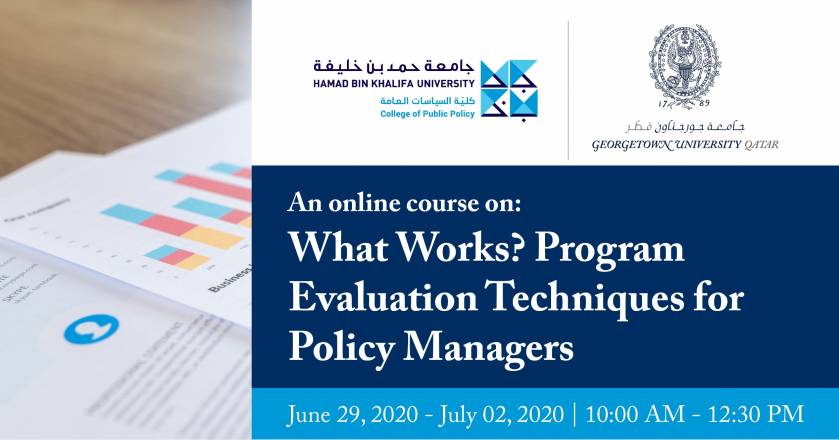What Works? Program Evaluation Techniques for Policy Managers
About the Course
The policy process is increasingly data-driven, but it is often challenging to make sense of competing estimates of program impacts. This four-day course will help you to understand where these estimates come from and which ones are the most credible. You will develop a more sophisticated understanding of the critical distinction between causation and correlation, you will learn about techniques that can provide plausible estimates of policies’ true impacts, and you will learn why these techniques often work… and why they sometimes don’t. You need no prior exposure to these concepts to take the course. We will be following a “ground-up” approach, under the assumption that you are learning the material for the first time. This course is made possible through a collaboration between Georgetown University in Qatar and the College of Public Policy at Hamad Bin Khalifa University, combining the expertise and resources of two of Qatar’s leading educational institutions.
Who Should Attend?
- Managers who supervise staff engaged in program evaluation activities;
- Professionals who advise policymakers and wish to develop a stronger evidence base for their recommendations
- Analysts at research organizations, government agencies, and nonprofits who seek to develop a more rigorous understanding of program evaluation techniques.
Course Instructors

Adam Thomas has been a faculty member at the McCourt School since 2010. He teaches courses in quantitative methods, microeconomics, and thesis development, and he has extensive experience teaching mid-career policy professionals at both Georgetown and at Harvard Universities. Prior to coming to Georgetown, Adam was a researcher at The Brookings Institution. His research has been published in leading journals in several different fields, including The American Journal of Public Health, the Journal of Policy Analysis and Management, The Future of Children, and The American Journal of Obstetrics and Gynecology. His work has also been cited in a variety of media outlets, including The Economist, The New York Times, The Washington Post, The Wall Street Journal, Rolling Stone, Congressional Quarterly, National Public Radio, and Slate. He received his Ph.D. in Public Policy from the Harvard Kennedy School.

Dr. Anis Ben Brik is an Associate Professor at HBKU College of Public Policy. Prior to joining HBKU, he served as Director of Family Policy Department at the Doha International Family Institute.Dr. Ben Brik has extensive experience in applying experimental and non-experimental methods to evaluate policies and has worked with government departments on a range of projects including social security, labor economics, and public economics. Dr. Ben Brik is a strong advocate for strengthening civil society engagement and collaborative partnerships at the United Nations.
This course is made possible through a collaboration between Georgetown University in Qatar and the College of Public Policy at Hamad Bin Khalifa University as well as HBKU Executive Education Center, combining the expertise and resources of two of Qatar’s leading educational institutions.

